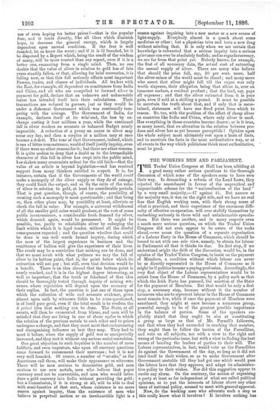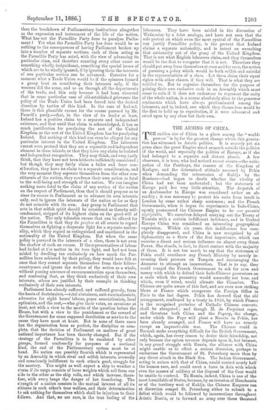THE WORKING MEN AND PARLIAMENT.
THE Trades' Union Congress at Hull has been nibbling at a good many rather serious questions to the thorough discussion of which none of the speakers seem to have seen their way. In demanding a reform of the Land Laws, they rejected the amendment in favour of the unpractical and impracticable scheme for the " nationalisation of the land" by a very small majority,-47 against 41. But narrow as the majority was, it was on the right aide, and we have no real fear that English working men, with their strong sense of what is practical, and their experience of the enormous diffi- culty of effective co-operation, will ever stultify themselves by embarking seriously in those wild and unfathomable specula- tions. But there was another, and in many respects even a much more serious question, on which the Trades' Union Congress did not even appear to be aware of the rocks ahead,—we mean the question of a separate organisation of a Labour Party in the House of Commons, which should be bound to act with one sole view, namely, to obtain for labour in Parliament all that it thinks its due. Its first step, if we understand aright the drift of the discussion, would be, in the opinion of the Trades' Union Congress, to insist on the payment of Members, a condition without which labour can never be as directly represented in the House of Commons as it might be if politics became a paying profession. Accordingly, the very first object of the Labour representatives would be to extort from the House of Commons, by a policy such as that which the Irish Party has pursued, the sanction of the State for the payment of Members. But that would be only a first step, a necessary step, because without it the number of labourers who are to represent labour in the House of Commons must remain few, while if once the payment of Members were sanctioned, they might at once become a numerous group, powerful enough to be of the greatest possible importance in the balance of parties. Some of the speakers ex- plicitly stated that they ought to aim at constituting a group as large as that of Mr. Parnell's followers, and that when they had succeeded in reaching that number, they ought then to follow the tactics of the Parnellites, and vote on all subjects, not with a view to the right and wrong of the particular issue, but with a view to finding the beat means of bending the leaders of parties to their will. The Labour representatives, in fact, would vote as the Parnellites do against the Government of the day, so long as it did not lend itself to their wishes, so as to make Government after Government unstable till they had got one which would pass the labour laws that they approve, and adapt its administra- tive policy to their wishes. Nor did this suggestion appear to excite any alarm. On the contrary, the notion of organising a party at least so far independent of what are called political opinions, as to put the interests of labour above any other . issue of national policy, seemed to meet with general approval.
Now, do the working men who advocate such a step as this really know what it involves ? It involves nothing less than the breakdown of Parliamentary institutions altogether as the expression and instrument of the life of the nation. What has not the Parnellite Party done to paralyse Parlia- ment ? Yet what the Parnellite Party has done would be as nothing to the consequences of having Parliament broken up into a number of separate sections, each of them acting as the Parnellite Party has acted, with the view of advancing its particular aims, and therefore counting every other cause as something wholly insignificant, something the special issues of which are to be wholly ignored, if by ignoring them the interests of one particular section can be advanced. Conceive for a moment what a Trade Union would be if the spinners formed a group bent on considering their interests only, if the weavers did the same, and so on through all the departments of the trade, and this only because it had been observed that in some particular case of old-established grievance the policy of the Trade Union had been forced into the desired direction by tactics of this kind. In the case of Ireland, there is this plausible excuse for the course pursued by Mr. Parnell's party,—that, in the view of its leader at least, Ireland has a positive claim to a separate and independent existence, and that until that claim is acknowledged, it has as much justification for paralysing the rest of the United Kingdom as the rest of the United Kingdom has for paralysing Ireland. But nothing of this kind can even be alleged for any particular interest in the United Kingdom. The labourers cannot even pretend that they are a separable and independent element in these islands, or that they have any claim to isolated and independent recognition. They may think, and very justly think, that they have not been hitherto sufficiently considered ; but though they may fairly claim a fuller and freer con- sideration, they have no claim to a separate consideration, and the very moment they separate themselves from the other con- stituents of the nation, they condemn their own action as fatal to the well-being and strength of the nation. We can imagine nothing more fatal to the claim of any section of the nation on the respect of Parliament, than that it should propose so to steer its course in Parliament as to advance its own interests only, and to ignore the interests of the nation so far as they do not coincide with its own. Any group in Parliament that acts in that selfish spirit should be considered as thereby self- condemned, stripped of its highest claim on the good-will of the nation. The only tolerable excuse that can be offered for the Parnellites is that they do profess at all events to regard themselves as fighting a desperate fight for a separate nation- ality, which they regard as extinguished and smothered in the nationality of the United Kingdom. But when the same policy is pursued in the interests of a class, there is not even the shadow of such an excuse. If the representatives of labour had looked at Vie matter in its true light, and had not been misled by dwelling too exclusively on how much the Par- nellites have achieved by their policy, they would have felt at once that they cannot separate themselves from their fellow- countrymen and ignore the welfare of the nation as a whole, without passing sentence of excommunication upon themselves, and confessing that, as they think exclusively of their own interests, others are justified by their example in thinking exclusively of their own interests.
Parliament has already suffered, and suffered gravely, from the knots of doctrinaires,—total abstainers, anti-vaccinationists, advocates for eight hours' labour, peace associationists, local optionists, and the rest,—who give their votes, on occasions at least, not with a view to the merits of the question before the House, but with a view to the punishment or the reward of the Government for some supposed dereliction or service to the cause they have most at heart. But in none of these cases has the organisation been so perfect, the discipline so com- plete, that the decision of Parliament on matters of great national importance has been thereby changed. But if the strategy of the Parnellites is to be emulated by other groups, formed confessedly for purposes of a sectional kind, the end of the Parliamentary system must be at hand. No nation can possibly flourish which is represented by an Assembly in which rival and selfish interests, avowedly and consciously indifferent to each other's good, struggle for the mastery. You might as well expect a ship to weather a storm if its cargo consists of loose weights which roll from one side to the other as the ship rolls, and which increase, there- fore, with every lunge the danger of her foundering. The erength of a nation consists in the mutual interest of all its citizens in each other's true welfare, and their determination t3 ask nothing for themselves which shall be injurious to their fellows. And that, we are sure, is the true feeling of the labourers. They have been misled in the discussion of Wednesday by a false analogy, and have not seen that the sole pretext on which even the most cynical of the Parnellites can justify Parnellite policy, is the pretext that Ireland claims a separate nationality, and is intent on wrenching that nationality out of the grasp of the United Kingdom. That is not what English labourers claim, and they themselves would be the first to recognise that it is not. Therefore they should put away from themselves at once and for ever, the notion of pursuing a policy which would be both selfish and suicidal in the representatives of a class. • LA them claim their equal rights with other classes, if they will. That is what they are entitled to. But to organise themselves for the purpose of gaining their own exclusive ends in an Assembly which must come to ruin if it does not endeavour to represent the unity of the whole nation, is a course absolutely alien to the generous sentiments which have always predominated among the labourers, and is, indeed, one which they themselves would be the first to hold up to reprobation, if it were advocated and acted upon by any class but their own.



































 Previous page
Previous page